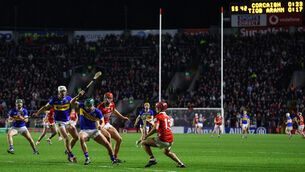Advantage rule is merely a hindrance
Sadly, hurling will have to live on with it for another season. It is a canon in the playing rules of Gaelic games that is outdated to the point that it now embarrasses referees on a regular basis because it asks them to guess.
But what can they do? Once indicating advantage, they have no option to call the play back, instead pray their willingness to let the game flow provides the fouled player and his team with something better or equal to the value of a free. It’s a preposterous position to be put in yet referees are applauded for allowing as much. From January 1 next, football refs will have a window of five seconds to see if there is any reward to the fouled player or his team before issuing a free, one of the most sensible playing rule changes in years.












